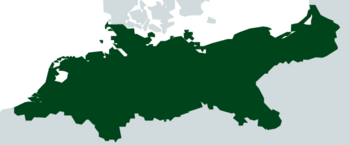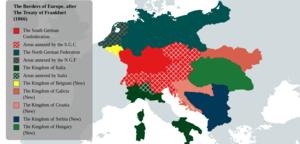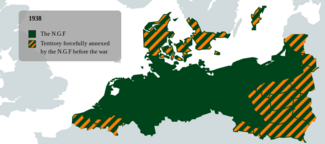North German Federation (Zwei Imperien): Difference between revisions
Istastioner (talk | contribs) (Created page with "Category:Countries Category:Countries in the Universe of "Zwei Imperien" Category:Zwei Imperien {{wip}} {{Infobox country |conventional_long_name = The North Germa...") |
Istastioner (talk | contribs) No edit summary |
||
| Line 97: | Line 97: | ||
The war had far-reaching consequences for the North German Federation, weakening their overall unity and position in the region. It also set the stage for further conflict and instability in the years to come. Overall, the First Großer Krieg was a devastating conflict that had a profound impact on both the North German Federation and the South German Confederation. It solidified the position of the latter as the dominant power in Central Europe, while weakening the former's standing in the region. | The war had far-reaching consequences for the North German Federation, weakening their overall unity and position in the region. It also set the stage for further conflict and instability in the years to come. Overall, the First Großer Krieg was a devastating conflict that had a profound impact on both the North German Federation and the South German Confederation. It solidified the position of the latter as the dominant power in Central Europe, while weakening the former's standing in the region. | ||
==The Inter-War Period== | ==The Inter-War Period== | ||
North German Federation also underwent significant changes during the interwar period, as a result of the war's impact on its economy, politics, and society. The country may have also experienced a rise in nationalism and a desire for greater power and influence in the region. | |||
==Völkisch Prussia (1923-1938)== | ==Völkisch Prussia (1923-1938)== | ||
| Line 103: | Line 104: | ||
===Völkiscm=== | ===Völkiscm=== | ||
[[Völkicsm (Zwei Imperien)|Völkicsm]] is a {{wp|far-right politics|far-right}}, {{wp|totalitarian}}, Ultra-{{wp|Ethno-nationalist}} {{wp|Ideology}} is characterized by its Support of [[Großdeutschland (Proposed State in Zwei Imperien)|German Unification]]. Völkiscm advocate the domination of the Germans over the world and the construction of a [[ | [[Völkicsm (Zwei Imperien)|Völkicsm]] is a {{wp|far-right politics|far-right}}, {{wp|totalitarian}}, Ultra-{{wp|Ethno-nationalist}} {{wp|Ideology}} is characterized by its Support of [[Großdeutschland (Proposed State in Zwei Imperien)|German Unification]]. Völkiscm advocate the domination of the Germans over the world and the construction of a [[Der Große Bund der Deutschen Reiche (Proposed State in Zwei Imperien)|Grand-Germanic state]] bringing together all the Germanic populations, and called for the implementation of [[Germanic Christianity (Zwei Imperien)|Germanic Christianity]]. Völkism is interested in the history and roots of Germany and Germans. They believed in the purity of the {{wp|Nordic race|Germanic "race"}} and relied on {{wp|anthropology}} and {{wp|philology}} to support this belief. | ||
==The Second Großer Krieg (1939-1944)== | ==The Second Großer Krieg (1939-1944)== | ||
The Second Großer Krieg (1939-1945) was a major conflict that involved the North German Federation (N.G.F) and the South German Confederation (S.G.C), as well as other European powers. At the start of the war, the S.G.C was initially overrun by the N.G.F and its allies, leading to a quick victory for the N.G.F. However, the S.G.C was not defeated completely, and a long and bloody guerrilla war ensued in the occupied territories. As the war progressed, the S.G.C received military aid from other European powers, including Italy and Hungary. This support enabled the S.G.C to mount a counter-offensive against the N.G.F, and by 1943, the S.G.C had regained most of its territory. The war continued to rage on, with both sides suffering heavy losses and engaging in brutal tactics. However, by 1945, the N.G.F was on the brink of defeat, and in April of that year, it surrendered to the S.G.C and its allies. The Second Großer Krieg had a devastating impact on Europe, leading to the deaths of millions of people and the destruction of entire cities. It also led to significant political changes in the region | |||
==Aftermath of WW2 & the Cold War== | ==Aftermath of WW2 & the Cold War== | ||
==Post Cold War Era== | ==Post Cold War Era== | ||
Revision as of 15:47, 15 April 2023
This article is incomplete because it is pending further input from participants, or it is a work-in-progress by one author. Please comment on this article's talk page to share your input, comments and questions. Note: To contribute to this article, you may need to seek help from the author(s) of this page. |
The North German Federation Norddeutscher Bund | |
|---|---|
|
Flag | |
| Motto: "Möge Gott mit uns sein" "May God be with us" | |
| Anthem: "Eine Ode an eine vergessene Sache" "An ode to a forgotten cause" | |
 | |
| Status | Sovereign state |
| Capital | Berlin |
| Largest city | Amsterdam |
| Official languages | German |
| Recognised regional languages | Czech,Dutch, Polish, Danish, and French |
| Ethnic groups (2023) | 55.5% Germans 20.4% Poles |
| Religion (2023) | 90.7% Christianity -82.63% Protestant |
| Demonym(s) | Pussian |
| Government | Federated parliamentary system semi-constitutional monarchy |
• Kaiser von Preußen | Wilhelm the VII |
• Grand Chancellor | Leon von Bismarck |
| Legislature | Die Legislative |
| Das Volksvertretung | |
| Nordreichstag | |
| Establishment | |
• North German Alliance | 19 August, 1866 |
• Formation of the Federation | 16 November 1869 |
• The War of Three Germanys | 2 August,1879 - 4 May,1882 |
| Area | |
• Total | 333,517 km2 (128,772 sq mi) |
| Population | |
• 2023 census | 62,335,485 |
• Density | 186.9/km2 (484.1/sq mi) |
| Currency | North German Mark (NG) |
| Calling code | +963 |
| Internet TLD | .ng |
The North German Federation (Norddeutscher Bund) was at first initially a Germans military alliance established in August 1866 under the leadership of the Kingdom of Prussia. The Federation came into existence following a Joinet-Prussian/Bavarian victory in the War of The Three Germanys in 1866 which resulted in the Peace of Prague. Almost faced Total Destruction after the Franco-Prussian War, to animosity towards it's historical rivals The Bavaria, Italia, and France, to an age of
Terminology
History
Formation (1866-1870)
Austro-Prussian War
Articles of Federation
The Articles of Federation were the founding documents of the North German Federation (N.G.F), established in 1862 after the victory of the N.G.F over the Austrian Empire in the War of Three Germanys. The Articles of Federation established the framework for the N.G.F's federal system of government, which included a centralized federal government with broad powers, as well as individual state governments.
The Articles of Federation established the Reichstag, a federal parliament consisting of representatives from each of the N.G.F's member states. The Reichstag was responsible for passing laws, approving budgets, and overseeing the work of the federal government. The Reichstag was presided over by a Chancellor, who was appointed by the President of the federation, and was responsible for leading the federal government.
The Articles of Federation also established the federal judiciary, with a Supreme Court responsible for interpreting federal law and resolving disputes between the federal government and the member states. The federal government was also responsible for foreign affairs, defense, and the regulation of interstate commerce.
War of Three Germanys
The Franco-Prussian War (1870-1871)
Der kalte Krieg (1883-1913)
In the aftermath of the Franco-Prussian War,Napoleon III exiled Otto von Bismark from Prussia, and forced the establishment of a Catholic-led coalition government in the North German Federation (N.G.F), and with the betrayal of the South German Confederation and Italia. These tensions would play a major role in European Politics, With The two powers competing for influence over smaller European states, which led to the formation of new alliances and the realignment of power in the region. and both sides soon imposed trade barriers and economic sanctions on the other side in an attempt to gain an advantage over the other. Soon the division between North & South will forever end any hopes of Unification on both sides.
Kulturkampf Höhepunkt
By 1889 the Kulturkampf had reached it's climax as tensions erupted between the Catholics and the Protestants in the Country. With a worried group of Catholic Politicians lead by August Reichensperger, and his bother launched a Coup d'état against Wilhelm I in order to place a Catholic Monarch as " Kaiser von Preußen" (or "Emperor of Prussia" in English). Though the French, and the S.G.C supported this action, and tried to help the Coupists politically, the plotters where militarily defeated when the (Mostly Protestant) Army sided with Wilhelm I.
As a result of The Katholischer Putsch, The Sommerkrise 1879 begin which was a series of protests that later escalated into riots, which begin with Anti-Catholic & Catholic groups clashing as Anti-Catholic elements where later joined by Socialists elements before both groups turned against each other before the riots where put down by the order of Kaiser Wilhelm I.
The Großer Krieg
The North German Federation played a significant role in the First Großer Krieg (Great War), as they were the aggressors in the conflict. Seeking to assert their dominance over the region, they launched a surprise attack on the South Germans, catching them off guard and inflicting significant initial losses. Despite having superior industrial and economic resources, the North Germans faced a difficult challenge in the face of the South German Confederation's strong defenses and well-trained army. They suffered significant setbacks and were ultimately pushed back to their own borders by 1917.
The war had far-reaching consequences for the North German Federation, weakening their overall unity and position in the region. It also set the stage for further conflict and instability in the years to come. Overall, the First Großer Krieg was a devastating conflict that had a profound impact on both the North German Federation and the South German Confederation. It solidified the position of the latter as the dominant power in Central Europe, while weakening the former's standing in the region.
The Inter-War Period
North German Federation also underwent significant changes during the interwar period, as a result of the war's impact on its economy, politics, and society. The country may have also experienced a rise in nationalism and a desire for greater power and influence in the region.
Völkisch Prussia (1923-1938)
The Völkisch Party (Zwei Imperien) in Prussia pursued an policy of aggressive expansionism, seeking to reclaim Fame and Territory lost in the First Großer Krieg and to establish dominance over neighboring countries.
Völkiscm
Völkicsm is a far-right, totalitarian, Ultra-Ethno-nationalist Ideology is characterized by its Support of German Unification. Völkiscm advocate the domination of the Germans over the world and the construction of a Grand-Germanic state bringing together all the Germanic populations, and called for the implementation of Germanic Christianity. Völkism is interested in the history and roots of Germany and Germans. They believed in the purity of the Germanic "race" and relied on anthropology and philology to support this belief.
The Second Großer Krieg (1939-1944)
The Second Großer Krieg (1939-1945) was a major conflict that involved the North German Federation (N.G.F) and the South German Confederation (S.G.C), as well as other European powers. At the start of the war, the S.G.C was initially overrun by the N.G.F and its allies, leading to a quick victory for the N.G.F. However, the S.G.C was not defeated completely, and a long and bloody guerrilla war ensued in the occupied territories. As the war progressed, the S.G.C received military aid from other European powers, including Italy and Hungary. This support enabled the S.G.C to mount a counter-offensive against the N.G.F, and by 1943, the S.G.C had regained most of its territory. The war continued to rage on, with both sides suffering heavy losses and engaging in brutal tactics. However, by 1945, the N.G.F was on the brink of defeat, and in April of that year, it surrendered to the S.G.C and its allies. The Second Großer Krieg had a devastating impact on Europe, leading to the deaths of millions of people and the destruction of entire cities. It also led to significant political changes in the region


